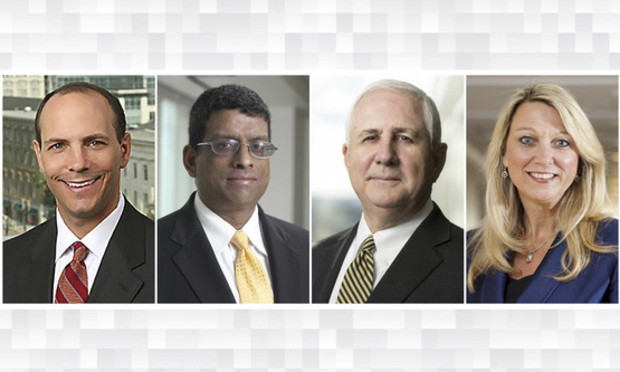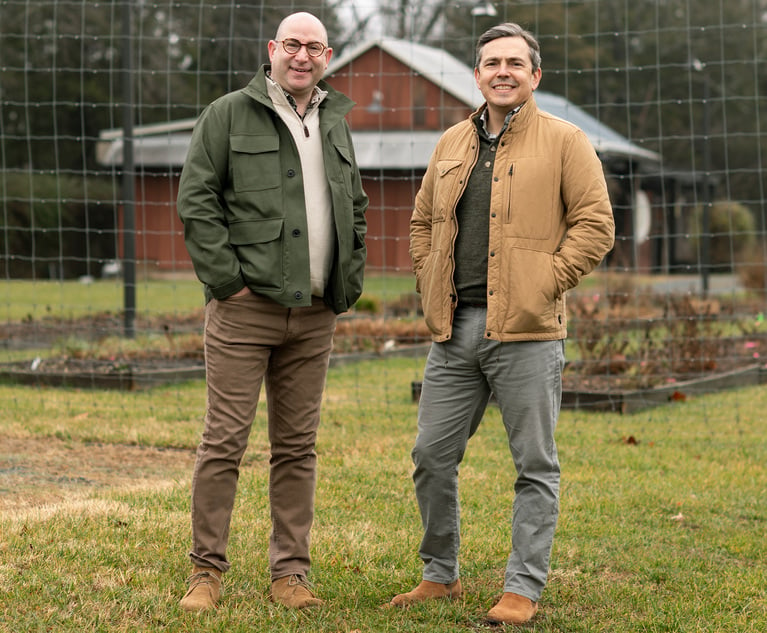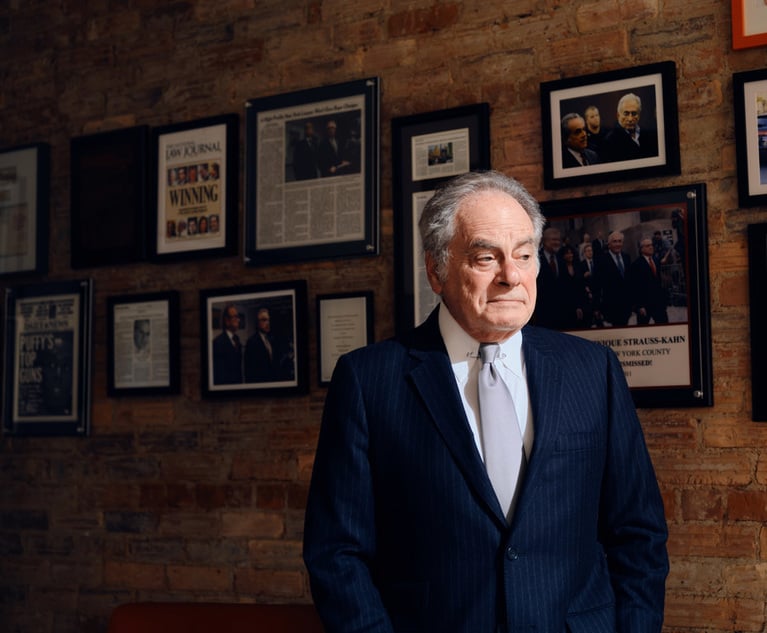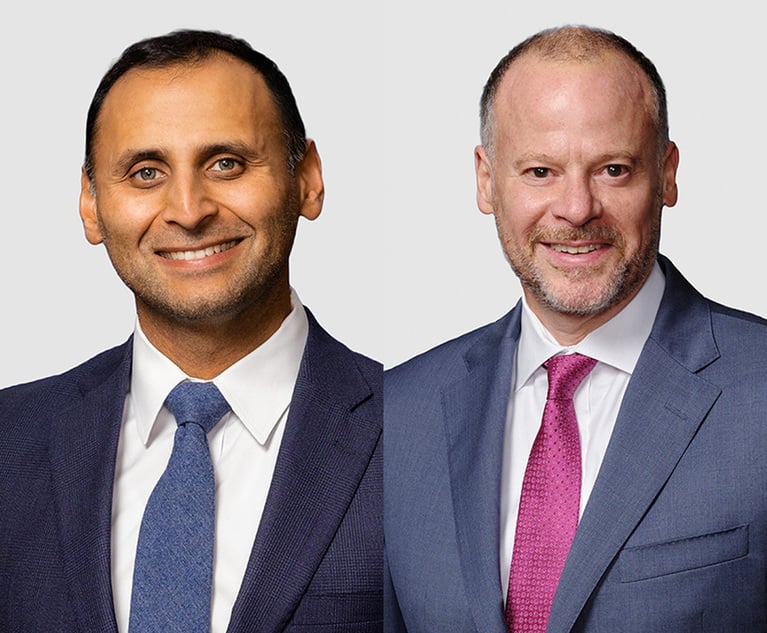Litigators of the Week: Teamwork Makes the Dream Work in Knocking Out Kasowitz FCA Case
When lawyers from five mega-firms came together to fight a $90 billion reverse False Claims Act lawsuit, their mission was clear from the start: stop Kasowitz.
October 26, 2017 at 10:37 PM
29 minute read

When lawyers from five mega-firms came together to fight a $90 billion reverse False Claims Act lawsuit, their mission was clear from the start: stop Kasowitz.
The firm of Kasowitz Benson Torres, acting as a relator, filed the FCA lawsuit last year alleging four chemical companies—The Dow Chemical Co., BASF Corp., Huntsman International and Covestro—failed to report risk information about certain chemicals to the U.S. Environmental Protection Agency and owed the government money for the failure. It was a novel theory that could have had dire consequences for the chemical companies, but the defendants' lawyers attacked the challenge head on, working as one giant team with no single lead attorney.
The group—our collective litigators of the week— included Christopher Landau of Kirkland & Ellis and Alice Fisher of Latham & Watkins for Dow Chemical, Reed Smith's Raymond Cardozo for Huntsman, Seth Rosenthal of Venable for BASF and Bradley Arant Boult Cummings' William Goodman for Covestro.
Fisher said the group came together early on and soon realized they all had similar arguments. So, they decided that instead of filing four separate briefs, they would collaborate on one joint brief in response to Kasowitz's nearly 200-page complaint.
“I think it was more efficient for the court, but it was also a strategic way to handle a big case like this,” she said.
The so-called “reverse” FCA claim by Kasowitz alleged that the companies violated the Toxic Substances Control Act's reporting requirements, and needed to pay the government for the fines they would have incurred, if the government had imposed them. If Kasowitz had won, it could have set a nightmare precedent for companies of all stripes.
“The ramifications would be truly stunning,” Kirkland's Landau said. “Basically, that you could use the False Claims Act to pass to the private sector the ability to enforce laws.”
The group hunkered down, focusing and refining their arguments. With so many prominent lawyers from across the country working on one team, it would have been easy for schedules, time zone differences, technical difficulties and egos to get in the way.
But that wasn't the case with this crew, Rosenthal of Venable said.
“Even when you have several lawyers within your own firm working on one brief, it's a difficult process,” he said. “Here, you had multiple lawyers from multiple firms working on a single document, which made it that much more cumbersome and that much more remarkable that things worked so seamlessly.”
The group divvied up the work, with each defendant focusing on a different portion of the argument and diving into their area of expertise. But they didn't shy away from editing one another and providing feedback. Landau said it was the most effective joint defense team he's worked on in 25 years.
“I think we clicked, not only personally, but substantively,” he said. “We all had similar views about what were our strongest arguments and what were our weakest … If we ever had a difference, we would talk it through, and everything was done by consensus. We never had anybody say, 'I won't agree to that.'”
After bouncing through three different judges in the Northern District of California, the team was able to move the case to Washington, D.C. That was important, Fisher said, because the judges in D.C. have significant expertise in government and FCA cases.
The government itself also stepped in, filing a rare statement of interest in the case on the side of the defendants. The government agreed with the companies that the FCA should not permit private parties to take on the enforcement role of the executive branch. Additionally, a ruling out of the Fifth Circuit in a notably similar case put another hole in the Kasowitz theory.
“That is a point that we hammered on relentlessly in our briefs,” Rosenthal said. “That Congress never could have intended the radical result that Kasowitz's theory contemplated.”
Luckily, U.S. District Judge Rosemary Collyer agreed, writing in her opinion Tuesday that the “TSCA creates a duty to obey the law, but the duty to pay penalties is not established until penalties are assessed and final.”
In the end, Cardozo of Reed Smith said the team's success came down to the basics.
“The key to success is that the statute defeats this case,” he said. “That was where it begins and where it ends. The statute does not permit this kind of case, and all of these lawyers understood how a solid statutory argument is put together. The text of the statute, the legislative history and common sense all squarely supported our view of the case.”

When lawyers from five mega-firms came together to fight a $90 billion reverse False Claims Act lawsuit, their mission was clear from the start: stop Kasowitz.
The firm of
The group—our collective litigators of the week— included Christopher Landau of
Fisher said the group came together early on and soon realized they all had similar arguments. So, they decided that instead of filing four separate briefs, they would collaborate on one joint brief in response to Kasowitz's nearly 200-page complaint.
“I think it was more efficient for the court, but it was also a strategic way to handle a big case like this,” she said.
The so-called “reverse” FCA claim by Kasowitz alleged that the companies violated the Toxic Substances Control Act's reporting requirements, and needed to pay the government for the fines they would have incurred, if the government had imposed them. If Kasowitz had won, it could have set a nightmare precedent for companies of all stripes.
“The ramifications would be truly stunning,” Kirkland's Landau said. “Basically, that you could use the False Claims Act to pass to the private sector the ability to enforce laws.”
The group hunkered down, focusing and refining their arguments. With so many prominent lawyers from across the country working on one team, it would have been easy for schedules, time zone differences, technical difficulties and egos to get in the way.
But that wasn't the case with this crew, Rosenthal of
“Even when you have several lawyers within your own firm working on one brief, it's a difficult process,” he said. “Here, you had multiple lawyers from multiple firms working on a single document, which made it that much more cumbersome and that much more remarkable that things worked so seamlessly.”
The group divvied up the work, with each defendant focusing on a different portion of the argument and diving into their area of expertise. But they didn't shy away from editing one another and providing feedback. Landau said it was the most effective joint defense team he's worked on in 25 years.
“I think we clicked, not only personally, but substantively,” he said. “We all had similar views about what were our strongest arguments and what were our weakest … If we ever had a difference, we would talk it through, and everything was done by consensus. We never had anybody say, 'I won't agree to that.'”
After bouncing through three different judges in the Northern District of California, the team was able to move the case to Washington, D.C. That was important, Fisher said, because the judges in D.C. have significant expertise in government and FCA cases.
The government itself also stepped in, filing a rare statement of interest in the case on the side of the defendants. The government agreed with the companies that the FCA should not permit private parties to take on the enforcement role of the executive branch. Additionally, a ruling out of the Fifth Circuit in a notably similar case put another hole in the Kasowitz theory.
“That is a point that we hammered on relentlessly in our briefs,” Rosenthal said. “That Congress never could have intended the radical result that Kasowitz's theory contemplated.”
Luckily, U.S. District Judge Rosemary Collyer agreed, writing in her opinion Tuesday that the “TSCA creates a duty to obey the law, but the duty to pay penalties is not established until penalties are assessed and final.”
In the end, Cardozo of
“The key to success is that the statute defeats this case,” he said. “That was where it begins and where it ends. The statute does not permit this kind of case, and all of these lawyers understood how a solid statutory argument is put together. The text of the statute, the legislative history and common sense all squarely supported our view of the case.”
This content has been archived. It is available through our partners, LexisNexis® and Bloomberg Law.
To view this content, please continue to their sites.
Not a Lexis Subscriber?
Subscribe Now
Not a Bloomberg Law Subscriber?
Subscribe Now
NOT FOR REPRINT
© 2025 ALM Global, LLC, All Rights Reserved. Request academic re-use from www.copyright.com. All other uses, submit a request to [email protected]. For more information visit Asset & Logo Licensing.
You Might Like
View All
Why the Founders of IP Boutique Fisch Sigler Are Stepping Away From the Law and Starting an AI Venture

Like a Life Raft: Ben Brafman Reflects on Nearly 50 Years as a Defense Attorney

Trying a Case for Abu Ghraib Detainees Two Decades After Abuse

Many Americans Don't Trust the Supreme Court This Election; David Boies Isn't One of Them
Trending Stories
- 1Judge in NYC Mayor's Public Corruption Case Has a Reminder for Advocates
- 2Former US State Dept. Official Joins King & Spalding Investigations Group
- 3Juror No. 3 Challenges Florida Defense Counsel During Closing Argument
- 4Fourth Circuit Seeks More Legal Briefs in Unresolved N.C. Supreme Court Election
- 5iRobot Picks Up Law Firm Partner as New Legal Chief
Who Got The Work
Michael G. Bongiorno, Andrew Scott Dulberg and Elizabeth E. Driscoll from Wilmer Cutler Pickering Hale and Dorr have stepped in to represent Symbotic Inc., an A.I.-enabled technology platform that focuses on increasing supply chain efficiency, and other defendants in a pending shareholder derivative lawsuit. The case, filed Oct. 2 in Massachusetts District Court by the Brown Law Firm on behalf of Stephen Austen, accuses certain officers and directors of misleading investors in regard to Symbotic's potential for margin growth by failing to disclose that the company was not equipped to timely deploy its systems or manage expenses through project delays. The case, assigned to U.S. District Judge Nathaniel M. Gorton, is 1:24-cv-12522, Austen v. Cohen et al.
Who Got The Work
Edmund Polubinski and Marie Killmond of Davis Polk & Wardwell have entered appearances for data platform software development company MongoDB and other defendants in a pending shareholder derivative lawsuit. The action, filed Oct. 7 in New York Southern District Court by the Brown Law Firm, accuses the company's directors and/or officers of falsely expressing confidence in the company’s restructuring of its sales incentive plan and downplaying the severity of decreases in its upfront commitments. The case is 1:24-cv-07594, Roy v. Ittycheria et al.
Who Got The Work
Amy O. Bruchs and Kurt F. Ellison of Michael Best & Friedrich have entered appearances for Epic Systems Corp. in a pending employment discrimination lawsuit. The suit was filed Sept. 7 in Wisconsin Western District Court by Levine Eisberner LLC and Siri & Glimstad on behalf of a project manager who claims that he was wrongfully terminated after applying for a religious exemption to the defendant's COVID-19 vaccine mandate. The case, assigned to U.S. Magistrate Judge Anita Marie Boor, is 3:24-cv-00630, Secker, Nathan v. Epic Systems Corporation.
Who Got The Work
David X. Sullivan, Thomas J. Finn and Gregory A. Hall from McCarter & English have entered appearances for Sunrun Installation Services in a pending civil rights lawsuit. The complaint was filed Sept. 4 in Connecticut District Court by attorney Robert M. Berke on behalf of former employee George Edward Steins, who was arrested and charged with employing an unregistered home improvement salesperson. The complaint alleges that had Sunrun informed the Connecticut Department of Consumer Protection that the plaintiff's employment had ended in 2017 and that he no longer held Sunrun's home improvement contractor license, he would not have been hit with charges, which were dismissed in May 2024. The case, assigned to U.S. District Judge Jeffrey A. Meyer, is 3:24-cv-01423, Steins v. Sunrun, Inc. et al.
Who Got The Work
Greenberg Traurig shareholder Joshua L. Raskin has entered an appearance for boohoo.com UK Ltd. in a pending patent infringement lawsuit. The suit, filed Sept. 3 in Texas Eastern District Court by Rozier Hardt McDonough on behalf of Alto Dynamics, asserts five patents related to an online shopping platform. The case, assigned to U.S. District Judge Rodney Gilstrap, is 2:24-cv-00719, Alto Dynamics, LLC v. boohoo.com UK Limited.
Featured Firms
Law Offices of Gary Martin Hays & Associates, P.C.
(470) 294-1674
Law Offices of Mark E. Salomone
(857) 444-6468
Smith & Hassler
(713) 739-1250






